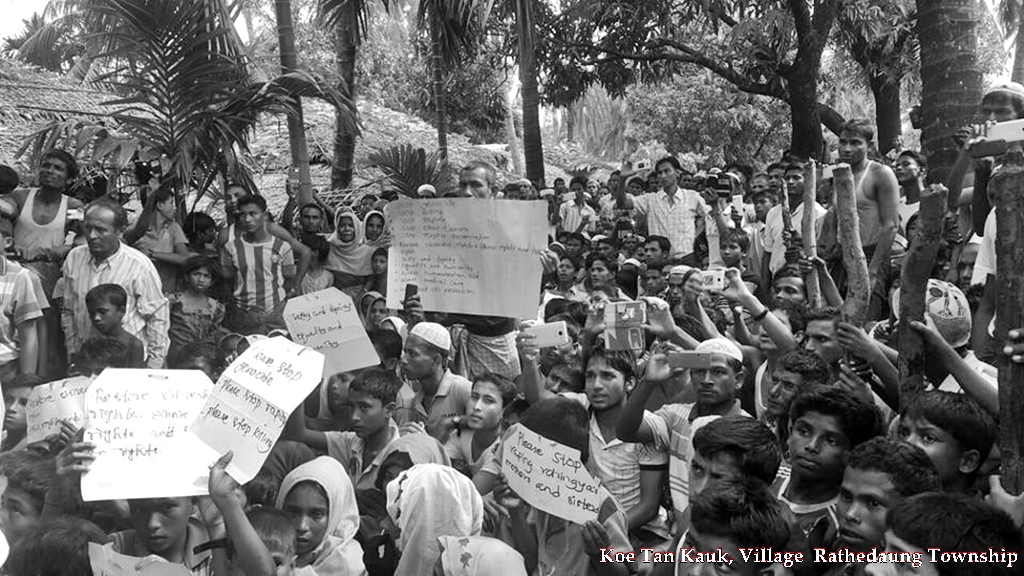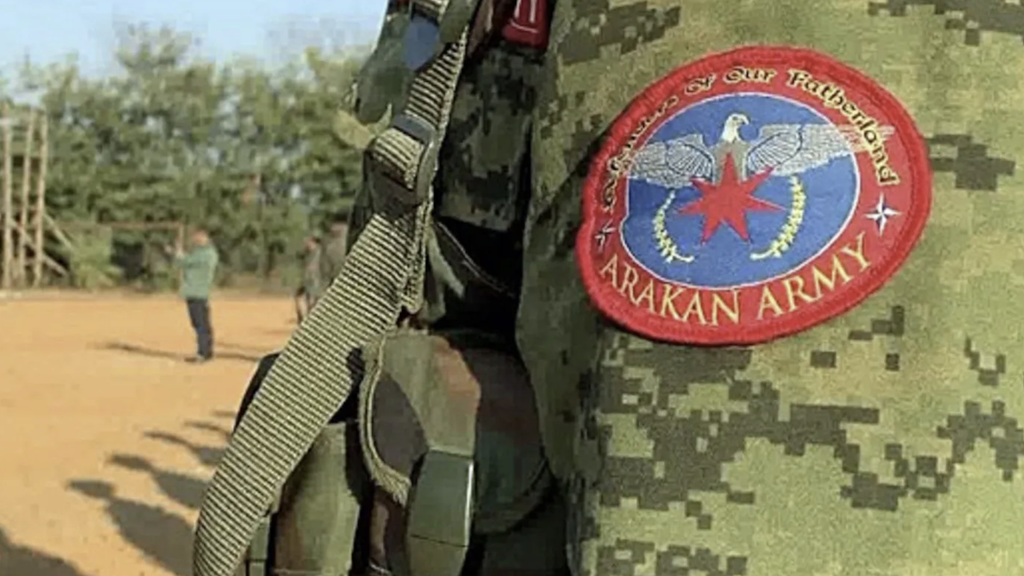
A Collective Punishment under the Myanmar’s State Terrorism
- 09/10/2019
- 0
By Aman Ullah
(On the 3rd Commemoration of 2016 Rohingya genocide)
Three years ago, on this day October 9, 2016, as many as 400 to 500 people armed with knives, slingshots and a small collection of firearms launched three separate, coordinated attacks on border police bases in northern Rakhine State, near Myanmar’s border with Bangladesh. Nine police officers and eight attackers were killed, and at least 50 weapons and 10,000 rounds of ammunition were looted. There have been several deadly clashes since, as the security forces attempt to capture the attackers and retrieve the arms cache, with at least 22 further casualties on both sides.
Since October 9, under the pretext of looking for attackers, the Myanmar military and police forces have been indiscriminately killing the Rohingya, torching and plundering their homes and villages.
Since then:
• More than 430 Rohingya have been killed by Burmese authorities.
• 195 Rohingya women have been raped by Burmese military
• Upwards of 130 Rohingya remain missing and thought to have been arbitrarily arrested
• Almost 2000 houses have been burned to ashes
• At least 40,000 Rohingya have been homeless and refugees in their own land
• 150,000 aid-reliant people have been left without food and medical care
• Thousands of Rohingyas are fleeing across the border to Bangladesh
Professor Penny Green of Queen Mary University of London said that, “We sounded the alarm in 2015 that what we saw amounted to the early stages of a genocidal process. Local sources now report a ramped up security and military presence, additional restrictions on freedom of movement, and a further limiting of access to food and healthcare. We are concerned that these latest developments may represent a new chapter in the persecution of the Rohingya, and a potentially more deadly phase of genocide.”
Needless to say, the preconditions for genocide are already in place. The world can continue to turn a blind eye to this atrocity at its own peril. There will come a day when future generations will ask what did we do to end these atrocities.
The Rohingya problem is one of the long-standing and deep rooted problems of the world. It is widespread, systematic and institutionalized. The new “democratic” regime led by the Nobel Peace Laureate Aung San Suu Kyi has turned a blind eye and a deaf ear towards the violence. Her lack of sympathy is manifested in her dubbing the Rohingya “Bengalis” indicating that she is, at least, in tacit agreement with the previous regime whom she struggled against to establish democracy in Myanmar. So overt is the discrimination that one of the country’s ministers in denying the charges of rape by soldiers said the Rohingyas “are very dirty”. This explicit denial of an ethnic minority as citizens of Myanmar was the official strategy adopted in 1982 under the dictator General Ne Win, turning an established community stateless in the blink of an eye. The Rohingya then were categorised as illegal immigrants, in spite of their recorded presence in the country since the 16th century in Rakhine State where, pre-genocide, they were definitely the majority.
Amnesty International describes it as “collective punishment.” A senior UN official suggested the goal appears to be “ethnic cleansing.” Regardless of how it is described, it is clear the violence unleashed by Myanmar against its minority Rohingya Muslim population has been devastating.
John McKissick, with the Office of the UN High Commissioner for Refugees, said security forces in Myanmar were “killing men, shooting them, slaughtering children, raping women, burning and looting houses, forcing people to cross the river into Bangladesh.” He accused the Myanmar military and border guard police of engaging in collective punishment of the Rohingya minority, arguing that they are using the killings of nine border guards in October as an excuse for the current crackdown.
Researchers from the International State Crime Initiative (ISCI) at QMUL’s School of Law in 2015 published the results of months of fieldwork in Myanmar’s Rakhine State. Their investigation concluded that the Myanmar state’s policies are genocidal. Their research exposed evidence of mass killings, forced labour, torture, sexual violence, arbitrary detention, institutional discrimination, and the destruction of communities. They were among the first to describe the plight of the Rohingya as genocide.
The researchers say that on-the-ground reports reveal a consistent picture of a trapped, terrified, and desperate community. They warn that reports are consistent with historical practices of state repression and violence in the region, echoing the brutal and indiscriminate crackdowns of 1977-8 and 1991-2 when hundreds of thousands of Rohingya fled to Bangladesh.
Alicia de la Cour Venning, lawyer and ISCI researcher said: “These events mark a disturbing but entirely predictable pattern in the genocidal process. Genocide begins by reducing the target group’s strength and undermining moral empathy for the victims. This stage is followed by more violent forms of persecution and eventually, particularly if perpetrators of violence are not held to account, mass killings.”
The researchers say that entire communities are now experiencing the genocidal stage of systematic weakening: state-sponsored denial of access to health care, livelihood, food, and civic life. They warn that the government’s objective is to render the population so physically and psychologically diminished that they are unable to engage in a purposeful life.
The group is strongly critical of Aung Suu Kyi and the National League for Democracy (NLD). Earlier this year Suu Kyi demanded foreign governments refrain from using the term ‘Rohingya’, and the Myanmar government’s public statements continue to demonise and deny the group’s existence.
Meanwhile the researchers say that the state run Global New Light of Myanmar implicitly referred to the Rohingya as a ‘terrorist’ ‘foreign’ threat in Northern Rakhine state and a ‘thorn which must be removed’. Myanmar’s own Human Rights Commission has refused to acknowledge the existence of the Rohingya and the domestic criminal justice system is being used as an instrument of persecution, according to the researchers.
Professor Green says: “Despite the fact that this is the most significant test of Suu Kyi’s leadership, the country’s de-facto leader has remained remarkably indifferent. Neither Suu Kyi nor her President Htin Kyaw have visited Rakhine state during the current crisis. Suu Kyi says very little, other than to repeat the line that investigations will be conducted fairly and according to the rule of law. Her claim that ‘we have not tried to hide anything on Rakhine’ is utterly disingenuous. Her statements run counter to reports that we, and our colleagues in the human rights community, are receiving from the Rakhine state and can only be interpreted as denial – a familiar and integral strategy deployed by criminal states to deflect blame.”
Thomas MacManus, lawyer and ISCI researcher says that Suu Kyi’s government has adopted “the military dictatorship-era tactics of blanket denial, an absolute ban on international observation, and severe limitations on humanitarian access within the region, the muzzling of the press, and the ‘blacklisting’ and deportation of human rights activists”.
“Aung San Suu Kyi must be held to account. The Rohingya need strong advocates and they need the world to understand that the persecution they face is genocidal. Only enormous pressure on the Myanmar government will succeed in halting the devastation. The Rohingya are staring death in the face,” he added.
Matthew Smith, chief executive of Fortify Rights, a non-profit human rights organization, also told that, “This is a very serious situation unfolding there. The government of Myanmar has commenced with what appears to be a very brutal crackdown, we’re documenting allegations of extrajudicial killings.”
“Essentially the Myanmar Army is moving into villages, suspecting all of the men and boys of being involved with this rather small group of armed men and committing a variety of human rights violations”.
Northern Rakhine state is “in effect an information black hole, and in situations where allegations of human rights violations are difficult or impossible to independently verify – because of state restrictive practices – the onus must be on the state to investigate or disprove those allegations”, Penny Green, said.
In Maungdaw Township in accordance with 2014 census there was 480,000 Muslim and 27,000 Rakhine and other non-Muslim population. According to Presidential Office Press Release, about 400 men planned and attacked to the 3 Border Guard Police Stations. Now Burmese army is going to give collective punishment to the more than 400 hundred thousand Rohingya for the 400 so-called attackers.
It is worth noting here that the use of lethal force by state security forces against a civilian is only lawful when necessary to prevent loss of life and serious injury and when proportionate to the threat at hand. The U.N. Basic Principles on the Use of Force and Firearms by Law Enforcement Officials stipulates that the “intentional lethal use of firearms may only be made when strictly unavoidable in order to protect life.” The U.N. Code of Conduct for Law Enforcement Officials requires officials to “use force only when strictly necessary and to the extent required for the performance of their duty.”
In situations of armed conflict, Article 42 of the Third Geneva Convention stipulates that the use of force “against those who are escaping or attempting to escape, shall constitute an extreme measure, which shall always be preceded by warnings appropriate to the circumstances.”
In all situations, under international humanitarian and human rights law, the authorities have a responsibility to protect civilians. But now, instead of protecting the civilians, the authority by itself conducting the act of extra-judicial killings, arbitrary arrests, and raids on Rohingya homes indiscriminately, which are tantamount to acts the of terrorism, state terrorism. State terrorism refers to act of terrorism conducted by a state against foreign targets or its own people. These are terror employed by tyrants against their subjects as Aristotle once wrote.
Kofi Annan, former UN Secretary- General, in a UN press conference of 2009, stated that, “time to set aside debates on so-called ‘state terrorism’. The use of force by states is already regulated under international law”. “…regardless of the differences between governments on the question of definition of terrorism, what is clear and what we can all agree on is any deliberate attack on innocent civilians [or non-combatants], regardless of one’s cause, is unacceptable and fits into the definition of terrorism.”







